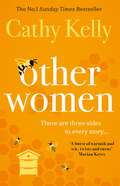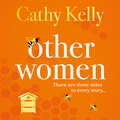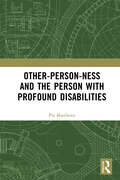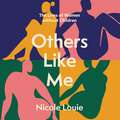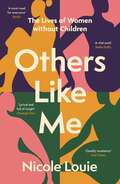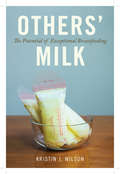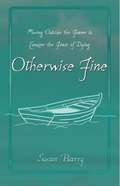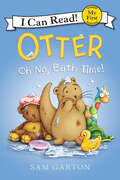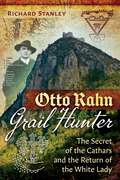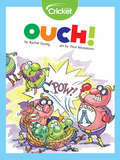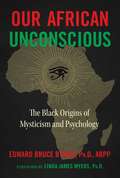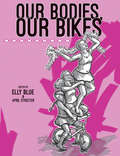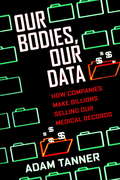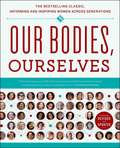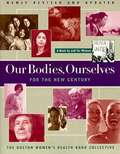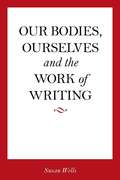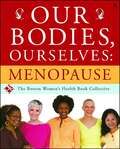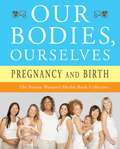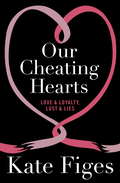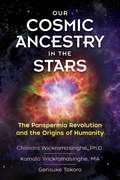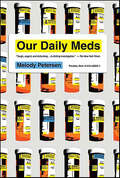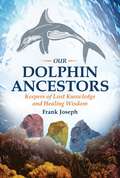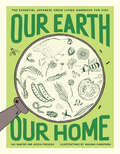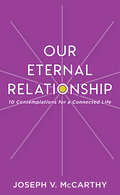- Table View
- List View
Other Women: The sparkling new page-turner about real, messy life that has readers gripped
by Cathy Kelly'A burst of warmth and wit, twists and turns' MARIAN KEYES'This is Cathy Kelly on top form writing about warm, believable women with real, messy lives' RACHEL HORE'Other Women captures the stories of three modern women... A real feel-good read' HEAT'The brilliant storyteller is back with another perfectly concocted tale' OK!---Three women. Three secrets. Three tangled lives...Sid wears her independence like armour. So when she strikes up a rare connection with unlucky-in-love Finn, they are both determined to prove that men and women can just be friends. Can't they?Marin has the perfect home, attentive husband, two beloved children - and a secret addiction to designer clothes. She knows she has it all, so why can't she stop comparing herself to other women?Bea believes that we all have one love story - and she's had hers. Now her life centres around her son, Luke, and her support group of fierce single women. But there's something that she can't tell anyone...With her inimitable warmth and wisdom, Cathy Kelly shows us that in the messy reality of marriage, family, and romance, sometimes it's the women in our lives who hold us together.---------------------------Praise for Cathy Kelly's irresistibly comforting storytelling:'Honest, funny, clever, it sparkles with witty, wry observations on modern life. I loved it' - Marian Keyes'This book is full of joy - and I devoured every page of it gladly' - Milly Johnson'Filled with nuggets of wisdom, compassion and humour, Cathy Kelly proves, yet again, that she knows everything there is to know about women' - Patricia Scanlan'Packed with Cathy's usual magical warmth' - Sheila O'Flanagan'Comforting and feel-good, the perfect treat read' - Good Housekeeping'With nuanced and believable characters, each grappling with complex, messy lives, the drama explodes from the first two pages of Other Women and doesn't let up until the final chapter' - Carmel Harrington
Other Women: The sparkling new page-turner about real, messy life that has readers gripped
by Cathy KellyDon't miss the stunning new novel from Cathy Kelly about sisterhood, love & friendship - The Wedding Party is available to pre-order now!'A burst of warmth and wit, twists and turns' MARIAN KEYES'This is Cathy Kelly on top form writing about warm, believable women with real, messy lives' RACHEL HORE'Other Women captures the stories of three modern women... A real feel-good read' HEAT'The brilliant storyteller is back with another perfectly concocted tale' OK!---Three women. Three secrets. Three tangled lives...Sid wears her independence like armour. So when she strikes up a rare connection with unlucky-in-love Finn, they are both determined to prove that men and women can just be friends. Can't they?Marin has the perfect home, attentive husband, two beloved children - and a secret addiction to designer clothes. She knows she has it all, so why can't she stop comparing herself to other women?Bea believes that we all have one love story - and she's had hers. Now her life centres around her son, Luke, and her support group of fierce single women. But there's something that she can't tell anyone...With her inimitable warmth and wisdom, Cathy Kelly shows us that in the messy reality of marriage, family, and romance, sometimes it's the women in our lives who hold us together.---------------------------Praise for Cathy Kelly's irresistibly comforting storytelling:'Honest, funny, clever, it sparkles with witty, wry observations on modern life. I loved it' - Marian Keyes'This book is full of joy - and I devoured every page of it gladly' - Milly Johnson'Filled with nuggets of wisdom, compassion and humour, Cathy Kelly proves, yet again, that she knows everything there is to know about women' - Patricia Scanlan'Packed with Cathy's usual magical warmth' - Sheila O'Flanagan'Comforting and feel-good, the perfect treat read' - Good Housekeeping'With nuanced and believable characters, each grappling with complex, messy lives, the drama explodes from the first two pages of Other Women and doesn't let up until the final chapter' - Carmel Harrington
Other Women: The sparkling new page-turner about real, messy life that has readers gripped
by Cathy KellyDon't miss the stunning new novel from Cathy Kelly about sisterhood, love & friendship - The Wedding Party is available to pre-order now!'A burst of warmth and wit, twists and turns' MARIAN KEYES'This is Cathy Kelly on top form writing about warm, believable women with real, messy lives' RACHEL HORE'Other Women captures the stories of three modern women... A real feel-good read' HEAT'The brilliant storyteller is back with another perfectly concocted tale' OK!---Three women. Three secrets. Three tangled lives...Sid wears her independence like armour. So when she strikes up a rare connection with unlucky-in-love Finn, they are both determined to prove that men and women can just be friends. Can't they?Marin has the perfect home, attentive husband, two beloved children - and a secret addiction to designer clothes. She knows she has it all, so why can't she stop comparing herself to other women?Bea believes that we all have one love story - and she's had hers. Now her life centres around her son, Luke, and her support group of fierce single women. But there's something that she can't tell anyone...With her inimitable warmth and wisdom, Cathy Kelly shows us that in the messy reality of marriage, family, and romance, sometimes it's the women in our lives who hold us together.---------------------------Praise for Cathy Kelly's irresistibly comforting storytelling:'Honest, funny, clever, it sparkles with witty, wry observations on modern life. I loved it' - Marian Keyes'This book is full of joy - and I devoured every page of it gladly' - Milly Johnson'Filled with nuggets of wisdom, compassion and humour, Cathy Kelly proves, yet again, that she knows everything there is to know about women' - Patricia Scanlan'Packed with Cathy's usual magical warmth' - Sheila O'Flanagan'Comforting and feel-good, the perfect treat read' - Good Housekeeping'With nuanced and believable characters, each grappling with complex, messy lives, the drama explodes from the first two pages of Other Women and doesn't let up until the final chapter' - Carmel Harrington
Other-person-ness and the Person with Profound Disabilities
by Pia MatthewsMany people think that profound disability presents us with a real problem, often because it seems difficult to connect with someone who does not seem to think or act like us. Positioning profound disability in this way immediately sets up a ‘them’ and ‘us’, where the person with profound disability becomes the problematic ‘other’. Attempts to bridge the ‘them’ and ‘us’ risk reducing everyone to the same where disability is not taken seriously.In contrast to a ‘them’ and ‘us’, and negative connotations of the other found in the existentialist philosophies of writers like Sartre and Beauvoir, Pia Matthews argues for a return to a positive view of the other. One positive approach to the other, based on an ethics of relationship as championed by Levinas, seems to mitigate the other-ness of profound disability. However, this still makes the person with profound disability dependent on the ethical concern of the more powerful other. Instead, this book argues for return to a personalist philosophy of being offered by Mounier, Marcel, and Wojtyła, and deepened by participation, belonging, and the possibility of contributing to the good of all. This deepened philosophy of being gives a more solid foundation for people who are especially at the mercy of others. It will be of interest to all scholars and students of disability studies, philosophy and anthropology.
Others Like Me: The Lives of Women Without Children
by Nicole LouieA deeply personal exploration of childless and childfree women in their own words.Others Like Me is the story of fourteen women around the world, from different walks of life, who don't have children. It's also the story of why Nicole Louie had to find them and what they taught her. Part memoir, part exploration of childlessness through candid conversations, this book showcases the many ways in which people find fulfilment outside of parenthood. And because the social expectation to procreate weighs the most on women, Louie focuses solely on them, their experiences and how they flourish outside of motherhood. In doing so, she upends the stereotypes that diminish women who are not mothers and offers reassurance and companionship on a path less known.
Others Like Me: The Lives of Women Without Children
by Nicole LouieA deeply personal exploration of childless and childfree women in their own words.Others Like Me is the story of fourteen women around the world, from different walks of life, who don't have children. It's also the story of why Nicole Louie had to find them and what they taught her. Part memoir, part exploration of childlessness through candid conversations, this book showcases the many ways in which people find fulfilment outside of parenthood. And because the social expectation to procreate weighs the most on women, Louie focuses solely on them, their experiences and how they flourish outside of motherhood. In doing so, she upends the stereotypes that diminish women who are not mothers and offers reassurance and companionship on a path less known.
Others' Milk: The Potential of Exceptional Breastfeeding
by Kristin J. WilsonBreastfeeding rarely conforms to the idealized Madonna-and-baby image seen in old artwork, now re-cast in celebrity breastfeeding photo spreads and pro-breastfeeding ad campaigns. The personal accounts in Others’ Milk illustrate just how messy and challenging and unpredictable it can be—an uncomfortable reality in the contemporary context of high-stakes motherhood in which “successful” breastfeeding proves one’s maternal mettle. Exceptional breastfeeders find creative ways to feed and care for their children—such as by inducing lactation, sharing milk, or exclusively pumping. They want to adhere to the societal ideal of giving them “the best” but sometimes have to face off with dogmatic authorities in order to do so. Kristin J. Wilson argues that while breastfeeding is never going to be the feasible choice for everyone, it should be accessible to anyone.
Otherwise Fine: Moving Outside the Frame to Conquer the Fears of Dying
by Susan BarryThe "worm at the core" is what William James called the fear of dying in each of us. Otherwise Fine treats the myriad forms of this fear, particularly those heightened in our prime middle years of good health. These can be more acute in Late-or-Never-Bloomers, those who suffer the "Blew-It Anxiety" of unmet potentials or the misfortune of circumstances, inauthentic or diffused identities; as well as those with skeptical or quasi-afterlife beliefs. Also offered are four guideposts for weathering the dying stage itself, and a look beyond it.
Otter: Oh No, Bath Time! (My First I Can Read)
by Sam GartonIt’s bath time for Otter, the irrepressible picture book character from I Am Otter, Otter in Space, and Otter Loves Halloween! Sure to be adored by fans of Llama Llama.Otter and Teddy love to play in the garden. But when they get dirty, they have to do something they do not love at all: take a bath! Otter Keeper says bath time is fun, but Otter and Teddy are not so sure. . . .Otter: Oh No, Bath Time! is a My First I Can Read book, which means it’s perfect for shared reading with a child.
Otto Rahn, Grail Hunter: The Secret of the Cathars and the Return of the White Lady
by Richard Stanley• Traces the journey of Otto Rahn, the occultist and one-time SS member who sought the Holy Grail and traveled widely throughout Europe as a researcher until his mysterious death in 1939• Explores the modern legacy of the officially heretical Christian sect known as the Cathars• Follows the author&’s own investigations into the location of the Grail and Rahn&’s legacy, taking readers on a journey through occult EuropeMeticulously following controversial 20th-century occultist, historian, and partially Jewish SS member Otto Rahn&’s investigations into the Holy Grail and Catharism, author and filmmaker Richard Stanley enters into the occult world of Europe. On his quest, the author encounters esoteric traditions that have survived since the Crusades and the Inquisition, ultimately finding a new spiritual path in his own life. At Rahn&’s family home in the Black Forest of Germany, Stanley unearths a cache of maps, photographs, and unpublished manuscripts. His journey in pursuit of Rahn&’s legacy then takes him to Montségur, in southern France, a mystical stronghold and one-time home of the Cathars, the esoteric and Gnostic Christian sect that was decimated in the medieval Albigensian Crusade. There he sees the extraordinary summer solstice light phenomenon that reveals the mystical past of the fortress and encounters witnesses who insist Rahn is still alive.Methodically visiting every site on Otto Rahn&’s esoteric path, from France to Iceland, the author untangles legend from truth as he looks at the connections between the Cathars, the Rosicrucians, Julius Evola, neo-Cathar and Freemason Déodat Roché, and the mystical bleeding stones known as Lapsit exillis. He also examines the prophecy of the return of Esclarmonde de Foix, the White Lady, medieval priestess of the Cathars who appeared to Rahn during his search for the Grail.
Ouch!
by Rachel YoungGetting shots may not be any fun, but these vaccinations prevent dangerous diseases. Learn how vaccinations help keep us healthy.
Our African Unconscious: The Black Origins of Mysticism and Psychology
by Edward Bruce Bynum• Examines the Oldawan, the Ancient Soul of Africa, and its correlation with what modern psychologists have defined as the collective unconscious • Draws on archaeology, DNA research, history, and depth psychology to reveal how the biological and spiritual roots of religion and science came out of Africa • Explores the reflections of our African unconscious in the present confrontation in the Americas, in the work of the Founding Fathers, and in modern psychospirituality The fossil record confirms that humanity originated in Africa. Yet somehow we have overlooked that Africa is also at the root of all that makes us human--our spirituality, civilization, arts, sciences, philosophy, and our conscious and unconscious minds. In this extensive look at the unfolding of human history and culture, Edward Bruce Bynum reveals how our collective unconscious is African. Drawing on archaeology, DNA research, depth psychology, and the biological and spiritual roots of religion and science, he demonstrates how all modern human beings, regardless of ethnic or racial categorizations, share a common deeper identity, both psychically and genetically--a primordial African unconscious. Exploring the beginning of early religions and mysticism in Africa, the author looks at the Egyptian Nubian role in the rise of civilization, the emergence of Kemetic Egypt, and the Oldawan, the Ancient Soul, and its correlation with what modern psychologists have defined as the collective unconscious. Revealing the spiritual and psychological ramifications of our shared African ancestry, the author examines its reflections in the present confrontation in the Americas, in the work of the Founding Fathers, and in modern Black spirituality, which arose from African diaspora religion and philosophy. By recognizing our shared African unconscious--the matrix that forms the deepest luminous core of human identity--we learn that the differences between one person and another are merely superficial and ultimately there is no real separation between the material and the spiritual.
Our Bodies, Our Bikes (Bicycle Ser.)
by Various AuthorsThis book collects many voices, mostly women, talking about and illustrating their experience at the intersection of bicycling and gender. None of us are doctors and we don't intend to give you medical advice. Likewise, we don't advocate doing anything that isn't legal where you are or safe by your own judgement. Please enjoy the book and go out and do what's right for you.
Our Bodies, Our Data: How Companies Make Billions Selling Our Medical Records
by Adam TannerHow the hidden trade in our sensitive medical information became a multibillion-dollar business, but has done little to improve our health-care outcomesHidden to consumers, patient medical data has become a multibillion-dollar worldwide trade industry between our health-care providers, drug companies, and a complex web of middlemen. This great medical-data bazaar sells copies of the prescription you recently filled, your hospital records, insurance claims, blood-test results, and more, stripped of your name but possibly with identifiers such as year of birth, gender, and doctor. As computing grows ever more sophisticated, patient dossiers become increasingly vulnerable to reidentification and the possibility of being targeted by identity thieves or hackers.Paradoxically, comprehensive electronic files for patient treatment—the reason medical data exists in the first place—remain an elusive goal. Even today, patients or their doctors rarely have easy access to comprehensive records that could improve care. In the evolution of medical data, the instinct for profit has outstripped patient needs. This book tells the human, behind-the-scenes story of how such a system evolved internationally.It begins with New York advertising man Ludwig Wolfgang Frohlich, who founded IMS Health, the world’s dominant health-data miner, in the 1950s. IMS Health now gathers patient medical data from more than 45 billion transactions annually from 780,000 data feeds in more than 100 countries. Our Bodies, Our Data uncovers some of Frohlich’s hidden past and follows the story of what happened in the following decades. This is both a story about medicine and medical practice, and about big business and maximizing profits, and the places these meet, places most patients would like to believe are off-limits.Our Bodies, Our Data seeks to spark debate on how we can best balance the promise big data offers to advance medicine and improve lives while preserving the rights and interests of every patient. We, the public, deserve a say in this discussion. After all, it’s our data.
Our Bodies, Ourselves
by Judy Norsigian Boston Women's Health Book CollectiveHailed by The New York Times as a "feminist classic," and "America's bestselling book on women's health," the comprehensive guide to all aspects of women's health and sexuality, including menopause, birth control, childbirth, sexual health, sexual orientation, gender identity, mental health and general well-being. <P><P>Six years after the 2005 overhaul of this classic guide to women's health, the 2011 edition focuses on what Our Bodies, Ourselves does best: provide information on women's reproductive health and sexuality; practical information on how find and access health information; and resources, stories, and information to educate women about health care injustices and inspire them to work collectively to address them. <P><P>This new edition of Our Bodies, Ourselves includes the latest vital information on: *Changes in the health care system--especially how health care reform affects women and how to get the care you need. * Safer sex--how to engage in pleasurable, satisfying sexual experiences while protecting your health and the health of your partner. * Environmental health risks--including minimizing exposure to everyday pollutants that endanger reproductive health. * Body image--resisting negative media stereotypes and embracing healthier approaches to looking and feeling good. * Local and global activism--using social media and organizing tactics to build community and advocate for policies that improve women's lives. * As well as crucial information about gender identity, sexual orientation, birth control, abortion, pregnancy and birth, perimenopause, and sexuality and sexual health as we age. Together with its companion website, OurBodiesOurselves.org, Our Bodies, Ourselves is a one-stop resource for women of all generations.
Our Bodies, Ourselves For The New Century: A Book By And For Women
by Boston Women's Health Book Collective StaffThe first major revision of the 1984 classic guide to women's health includes information on such topics as breast cancer treatment options, preventing and living with AIDS, and new developments in contraception and reproductive technology.
Our Bodies, Ourselves and the Work of Writing
by Susan WellsWells (English, Temple U. ) has written an engaging study of the women and process behind the groundbreaking work, Our bodies ourselves, both its first 1973 edition and the 1984 revision. Produced by the Boston Women's Health Book Collective, Our bodies, ourselves was a revolutionary work, one which was written collectively. Wells presents a detailed chronological account of the conferences and meetings that led to the assignment of topics, the tussles with the publisher to maintain their voice, and later, their focus on the issue of the medicalization of women, in part as this was formulated by Brandeis sociologist Kenneth Zola. This is a superb, in-depth case study of an important organization of American feminism and its influential voice. Annotation ©2010 Book News, Inc. , Portland, OR (booknews. com)
Our Bodies, Ourselves: Menopause
by Vivian Pinn Judy Norsigian Boston Women's Health Book CollectiveFROM THE EDITORS OF THE CLASSIC "BIBLE OF WOMEN'S HEALTH," A TRUSTWORTHY, UP-TO-DATE GUIDE TO HELP EVERY WOMAN NAVIGATE THE MENOPAUSE TRANSITION For decades, millions of women have relied on Our Bodies, Ourselves to provide the most comprehensive, honest, and accurate information on women's health. Now, in Our Bodies, Ourselves: Menopause, the editors of the classic guide discuss the transition of menopause. With a preface by Vivian Pinn, M.D., the director of the Office of Research on Women's Health at the National Institutes of Health, Our Bodies, Ourselves: Menopause includes definitive information from the latest research and personal stories from a diverse group of women. Our Bodies, Ourselves: Menopause provides an in-depth look at subjects such as hormone therapy and sexuality as well as proven strategies for coping with challenges like hot flashes, mood swings, and night sweats. In clear, accessible language, the book dispels menopause myths and provides crucial information that women can use to take control of their own health and get the best care possible. Our Bodies, Ourselves: Menopause is an essential resource for women who are experiencing -- or expecting -- menopause.
Our Bodies, Ourselves: Pregnancy and Birth
by Judy Norsigian Boston Women's Health Book CollectiveALL THE INFORMATION YOU NEED TO MAKE WISE DECISIONS ABOUT YOUR PREGNANCY AND THE BIRTH OF YOUR CHILD -- FROM THE EDITORS OF THE CLASSIC "BIBLE OF WOMEN'S HEALTH" Pregnancy and birth are as ordinary and extraordinary as breathing, thinking, or loving. But as soon as you announce you're expecting, you may be bombarded with advice from every angle -- well-meaning friends, relatives, medical professionals, even strangers want to weigh in on what you should or shouldn't do, and it's easy to feel overwhelmed by their conflicting recommendations. Our Bodies, Ourselves: Pregnancy and Birth will help you sort fact from fiction, giving you the most accurate research, up-to-date information, and the firsthand experiences of numerous women who have been exactly where you are today. You'll get the tools you need to take care of yourself and your baby during and after your pregnancy, from tips on eating well during pregnancy to strategies for coping with stress and depression. Learn everything you need to know about: CHOOSING A GOOD HEALTH CARE PROVIDER SELECTING A PLACE OF BIRTH UNDERSTANDING PRENATAL TESTING COPING WITH LABOR PAIN SPEEDING YOUR PHYSICAL RECOVERY ADJUSTING TO LIFE AS A NEW MOTHER OUR BODIES, OURSELVES: PREGNANCY AND BIRTH IS AN ESSENTIAL RESOURCE FOR WOMEN THAT WILL GUIDE YOU THROUGH THE MANY DECISIONS AHEAD.
Our Cheating Hearts: Love and Loyalty, Lust and Lies
by Kate FigesBy the author known and respected for her acclaimed books on relationships.Most of us manage to be monogamous, most of the time, but who cannot imagine themselves committing the 'crime' of adultery? Does being 'faithful' mean the same to everyone? Why DO people have affairs?Using real life testimony alongside the most current research, Our Cheating Hearts looks at the big questions around love and commitment. It lifts taboos, asks the tough questions and shows how in our progressive time monogamy has become the new ideal.Some people manage monogamy. For the countless others that don't, Our Cheating Hearts opens the debate and provides the honest approach that's essential.
Our Cosmic Ancestry in the Stars: The Panspermia Revolution and the Origins of Humanity
by Chandra Wickramasinghe, Ph.D. Kamala Wickramasinghe Gensuke TokoroAn exploration of how acceptance of panspermia will soon change history • Offers extensive scientific proof of panspermia--that life arose on Earth via comets and that evolution is seeded by viruses arriving via comets and interstellar dust • Explores the major philosophical, psychological, cultural, religious, and environmental ramifications of the acceptance of this new scientific worldview Mainstream consensus is that life arose on Earth spontaneously out of “primordial soup.” Yet this theory, as well as the Darwinian “survival of the fittest” concept as it relates to major steps in evolution, has no scientific basis or proof. Where, then, did life come from? As the authors show, with conclusive scientific evidence, life came from space--a concept known as “panspermia.” We humans, and all other life on Earth, evolved over millennia in response to viruses that arrived via comets, and we continue to do so. Exploring the philosophical, psychological, cultural, and environmental ramifications of the acceptance of panspermia, the authors show how the shift will be on par with the Copernican Revolution--when it was finally accepted that the Earth was not the center of the Universe. Explaining the origins of the panspermia theory in the work of the late Sir Fred Hoyle, the authors reveal the vast body of evidence that has accumulated over the past 4 decades in favor of the cosmic origins of life, including viral inserts found in DNA that have shaped our human genome over millions of years. They show how the tiniest of viruses, microscopic animals (tardigrades), and even seeds have been found to be natural cosmonauts. The authors also show how space-borne viruses play a crucial role in the positive evolution of life and that our entire existence on this planet is contingent on the continuing ingress of cosmic viruses. Revealing how panspermia offers answers to some of humanity’s longstanding questions about the origins of life, the authors discuss the impact this shift in understanding will have on our relationship with the Earth and on culture, history, and religion. And perhaps the most dramatic ramification of all is that acceptance of panspermia means acceptance that Earth is not unique--that other life-filled planets exist and intelligent life is common in the Universe. Not only did we come from space, but we are not alone.
Our Daily Meds
by Melody PetersenIn the last thirty years, the big pharmaceutical companies have transformed themselves into marketing machines selling dangerous medicines as if they were Coca-Cola or Cadillacs. They pitch drugs with video games and soft cuddly toys for children; promote them in churches and subways, at NASCAR races and state fairs. They've become experts at promoting fear of disease, just so they can sell us hope. No question: drugs can save lives. But the relentless marketing that has enriched corporate executives and sent stock prices soaring has come with a dark side. Prescription pills taken as directed by physicians are estimated to kill one American every five minutes. And that figure doesn't reflect the damage done as the overmedicated take to the roads. Our Daily Meds connects the dots for the first time to show how corporate salesmanship has triumphed over science inside the biggest pharmaceutical companies and, in turn, how this promotion driven industry has taken over the practice of medicine and is changing American life. It is an ageless story of the battle between good and evil, with potentially life-changing consequences for everyone, not just the 65 percent of Americans who unscrew a prescription cap every day. An industry with the promise to help so many is now leaving a legacy of needless harm.
Our Dolphin Ancestors: Keepers of Lost Knowledge and Healing Wisdom
by Frank JosephReveals the shared ancestry behind our affinity with dolphins and our shared destiny • Explains how we are both descendants of the aquatic ape and still share many physiological features with dolphins that set us apart from other primates • Explores dolphins’ communication with other species and how dolphin therapy has miraculous effects on people with autism, cancer, stroke, and depression • Explores the connections between dolphins and Atlantis and Lemuria Wild animals avoid contact with humans, but wild dolphins seek us out to play and socialize, even going so far as to voluntarily rescue people from drowning. What explains this remarkable natural affinity? Revealing the evolutionary basis for our special relationship with dolphins, Frank Joseph explains how we are both descendants of the same ancient branch of human-ity. Building upon the aquatic ape theory, he details how we both began on land but devastating floods forced our distant ancestors into the seas, where humanity developed many of the traits that set us apart from other primates, such as our instinctive diving reflex and our newborns’ ability to swim. But while some of the aquatic apes returned to land, later evolving into modern humans, some remained in the cradle of Mother Ocean and became our dolphin cousins. Integrating scientific research on dolphin intelligence, communication, and physiology with enduring myths from some of the world’s oldest cultures, such as the Aborigines, Norse, Greeks, and Celts, the author examines our physical commonalities with dolphins, including their vestigial thumbs and legs, birth processes, and body temperature. He explores dolphins’ uncanny ability to diagnose disease such as cancer in humans and how dolphin therapy has had miraculous effects on children with autism, victims of stroke, and those suffering from depression. He provides evidence for dolphins’ different attitudes toward men, women, and children, their natural affinity with cats and dogs, and their telepathic communication with other species, including ours. He explores dolphins’ mysterious role in the birth of early civilization and their connections with the Dog Star, Sirius, and Atlantis and Lemuria--a bond still commemorated by annual gatherings of millions of dolphins. As Frank Joseph shows, if we can learn to fully communicate with dolphins, accessing their millennia-old oral tradition, we may learn the truth about humanity’s origins and our shared future, when humankind may yet again quit the land for a final return to the sea.
Our Earth, Our Home: Have Fun and Live Sustainably!
by Kai Sawyer Azusa FukuokaBeautifully illustrated, energetic guide from Japan for forward-thinking kids and parents on how to live in harmony with our earth—contains sections on DIY crafts, design thinking, mindfulness, gardening, eating, permaculture, and moreYoung readers will be swept along by Kai, the guide on this journey, who only has five rules:1) Be yourself2) You have everything you need3) You can create whatever you want4) We are all connected5) Have fun with life! With those rules as the north star, Ranger Kai teaches kids and adults about eating, permaculture, mindfulness, design thinking, creating a garden, DIY crafts, and more. Each section includes illustrated step-by-step guides and activity ideas. Many books on climate change and green living for kids focus on recycling or other small-picture ideas. This book from Japan dares to truly envision a post-carbon future—and not only that, embraces it and charts the path towards a truly fun life, in harmony with the Earth.
Our Eternal Relationship: 10 Contemplations for a Connected Life
by Joseph V. McCarthyMany years ago, Joseph V. McCarthy dreamed a revelation that shattered his world-view and altered his life direction forever. After nine years as a correctional officer in the prison system, Joe left for a monastic life at Tarrawarra Abbey in Victoria, Australia. He lived as a monk for six years, immersed in a life of spiritual contemplation. During this time, he was introduced to “A Course in Miracles”. It’s message of divinity as a tangible force in the world prompted Joe to reflect on its presence in the wider community beyond the cloister. Joe left the monastery and eventually became a training officer for emergency services in a rural/tourist area. While engaged in lost person searches; flood, cliff and car crash rescues; and more, he witnessed tragic misfortune and miraculous survival. His eyes were opened to the fragility of this precious life. In his role as a spiritual director, and later as pastoral carer in a hospital, Joe realised the deep longing in all human hearts for spiritual meaning and peace. He was inspired to write ‘Our Eternal Relationship’, which shares the key insights and contemplations that were so transformative in his journey. From prison officer to monk to emergency rescuer to pastoral carer for the sick and dying, Joseph V. McCarthy has not flinched from witnessing life’s darkest pits of despair. He believes, “There is not a person in this world who does not deserve our sympathy,” and he offers simple steps towards a life of spiritual integrity and contribution, free of religious dogma.
